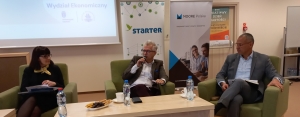|
|
|
|
|
|
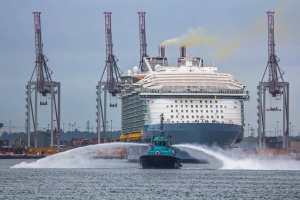

 By Marek Grzybowski
By Marek Grzybowski
CruiseBritain members ended 2023 with success and high revenues for ports and cities. The Port of Dover was named ‘Best UK Departure Port’ and the Port of Belfast ended the year with the ‘Best UK & Ireland Port of Call’ title. Over 460 cruise ship calls and 2.6 million passengers visiting Southampton contributed over £1 billion to the local and regional economy.
In Southampton, there are over 15,000 people in the maritime tourism sector. jobs offered by local entrepreneurs, both those operating in ports and serving tourists in the city and Hampshire.
Stephen Manion, executive director of Go! Southampton, said: Cruise passengers are an extremely important part of the Southampton and Hampshire tourism economy – quotes the director of CruiseBritain.
Maritime tourists visit Hampshire for its charming scenery. It is a land located in the south of England, situated on the English Channel and the Solent Strait. According to the local tourism organization, they spend more than average.
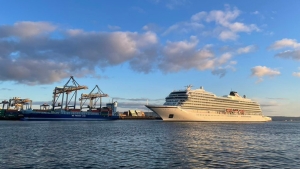
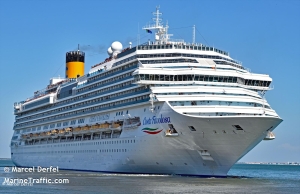
Go! Southampton
“We look forward to working with the Port of Southampton to increase not only visitor numbers, but also their ability to access the city and all its attractions,” says Stephen Manion.
The operator of the Port of Southampton is Associated British Ports (ABP). Southampton Airport is 5 miles from the port. It is one of the leading cruise ports in Europe. It is distinguished by five cruise terminals. The new Cruise Terminal (Berth 102) was built as a joint venture between MSC Cruises and Norwegian Cruise Line Holdings. The terminal also serves luxury cruise lines Regent Seven Seas Cruises and Oceania Cruises.
The Port of Southampton is home to the UK’s first high-capacity land-based power plant used to power ships. It allows cruise ships to provide electricity from the quayside. This allows combustion engines to be turned off in the port. This, in turn, enables the port to achieve zero emissions, which is one aspect of ABP’s commitment to sustainable development.
Another activity of ABP is encouraging passengers to use public transport. – We are working with the City Council and port partners to ensure that air quality levels continue to be below nationally set thresholds, and thanks to port air quality monitors we can accurately measure this – emphasizes ABP.
Alastair Welch, ABP regional director for Southampton, said: “We are proud of the role we play in supporting the local, regional and national economy. While this is a record year for cruises, we continue to invest in this and other port-related sectors to ensure the long-term success of our port city.
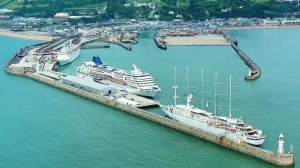
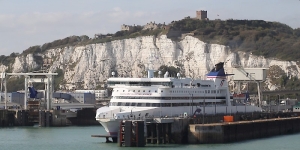
Dover – the White Cliffs region
Commenting on Dover’s win in the ‘Best UK Departure Port’ category, Cruise Critic UK & AU said: ‘as well as its stunning location and welcoming White Cliffs, Dover serves an increasing number of cruise lines, including Seabourn, Fred. Olsen, Hurtigruten, Costa and Carnival Pride. We also positively assess investments in infrastructure and sustainable development, including the construction of a completely new marina and cooperation with local and international partners in order to create a port that is more friendly, sustainable and equipped with modern technologies,” reported “Cruise Critic UK & AU”.
Doug Bannister, Chief Executive Officer of the Port of Dover, said upon receiving the award: “This is the perfect end to a great year for Dover Cruise and a testament to the world-class customer service provided by our team. Leading cruise lines have chosen the iconic backdrop of the White Cliffs and Dover Castle for launch visits and special celebrations throughout the year, states Bannister. – My thanks go to our team for providing hundreds of thousands of cruise guests with lifelong memories in 2023, and to our cruise lines for choosing Dover as their number one destination in the UK. See you in 2024! – said Doug Bannister, quoted by CruiseBritain.
“It has been a phenomenal year for the cruise industry,” said Adam Coulter, editor-in-chief of Cruise Critic UK & AU. He noted that not only had record sales been achieved, but also that “travellers come to the seaside for a high-quality holiday. And for travelers based in the UK, the introduction of new ships has helped to further drive interest in cruises.”
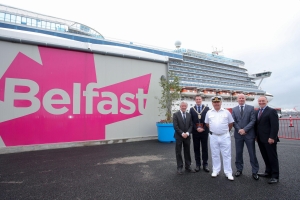
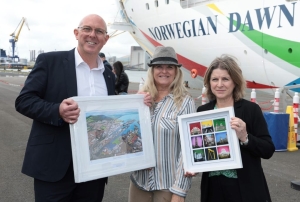
Belfast – “Best UK & Ireland Port of Call”
The Port of Belfast has been named ‘Best UK & Ireland Port of Call’ in the 15th edition of the Cruise Critic UK Editors’ Picks Awards.
The Port of Belfast Authority earned this award by serving 159 calls from 32 cruise operators in 2023, an 8% increase on the record set in 2019.
Cruise Critic, a subsidiary of TripAdvisor, is the world’s leading cruise review site and online cruise community. Each year it announces the winners of the Editors’ Picks Awards, selected by an international panel of cruise experts.
After receiving the Cruise Critic award, Michael Robinson, director of Belfast Harbour, said: “This award recognizes the fantastic work that everyone in the cruise industry has done to create a product that will ensure the satisfaction of visitors to Northern Ireland.
Robinson highlighted that there has been significant investment in cruise ship facilities in Belfast.
– We receive positive opinions from passengers, crew and cruise line management, both about the high level of services provided and the quality of the tourist offer – noted Robinson. – As part of Cruise Belfast, our partnership with Visit Belfast, a lot of work has been done to promote the region and attract visitors here. Working with tour operators, the hospitality sector and industry organizations, we have helped create an attractive offer that gives cruise lines the confidence to return to the region and increase the number of connections they make each year, emphasized Robinson.
Gerry Lennon, chief executive of Visit Belfast, said: “Belfast is a fascinating, unique destination, rich in history, culture, heritage and attractions, boasting great hospitality, a rich shopping offer and a wealth of world-class attractions. I am delighted that its success has been officially recognized this year by Cruise Critic as the best port of call in the UK and British Isles.
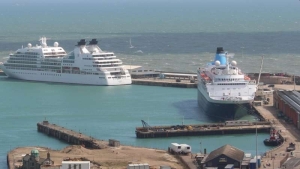
In 2024, from Dover to Norway, Iceland, Portugal and the Azores
British ports predict that 2024 will be even better than 2023. 90 ships will visit Portsmouth this year, which will make 2024 a record year in terms of cruise ship moorings. This is the result of ten new calls. About 155,000 people will arrive on ships. passengers. Many of them will start their journey in the new terminal.
In 2024, Dover residents will witness six inaugural calls. There will even be days with three ships mooring at the passenger terminal at the same time – emphasizes the Port of Dover management. There is also a new marina on the newly developed Dover waterfront. The Marina Curve and Clocktower Square recreational areas adjacent to the terminal are now open for use.
– There is no doubt that 2024 will be an unforgettable year for us. We look forward to the return of all our cruise services and look forward to welcoming those operators who are visiting us for the first time,” said Peter Wright, Cruise Director at the Port of Dover.
The increased activity of cruise owners is evidenced by Clare Ward’s statement. Director of Products and Customer Service at Fred. Olsen Cruise Lines, said: “We are delighted to be back in Dover again with five new cruises launching this summer to attractive ports including Norway, Iceland, Portugal and the Azores.
20 tour operators have contracted entries. From Dover, there are cruises to Norwegian fjords, Baltic Sea ports, and ports of the British Isles. It is also the home port for the world’s leading cruise lines.
It should be added that you can travel from Dover to London by high-speed rail. After an hour, passengers get off at Victoria station, in the center of the British capital, a dozen or so minutes’ walk to Buckingham Palace.
Photos: Cruise port authorities: Dover, Southampton, Belfast
|
|
Marek Grzybowski (5) questions to Dorota Lost Sieminska, Director, Legal Affairs and External Relations Division, IMO
The leading topic of the meeting was the role of women in world administration, science and maritime business during the WISTA Poland meeting.
– Ladies work in all areas related to the 17 IMO Sustainable Development Goals – Dorota Lost Sieminska, Director, Legal Affairs and External Relations Division, IMO emphasized during the meeting.
We asked Director Dorota Lost Sieminska about the role and tasks of the Legal Affairs and External Relations Division of the IMO in activities for the development of safety in maritime transport, activities for sustainable development and other factors ensuring the functioning of people at sea.
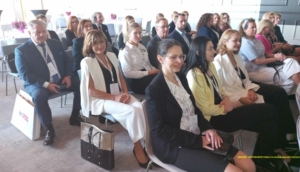
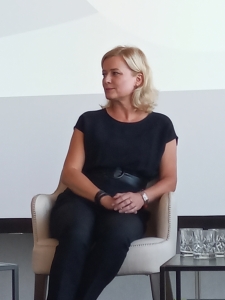

Marek Grzybowski: Please, describe the fields in which the Legal Affairs and External Relations Division, IMO operates?
Dorota Lost Sieminska, Director, Legal Affairs and External Relations Division, IMO:
Role of the Legal Affairs and External Relations Division
The Legal Affairs and External Relations Division consists of four offices: the Legal Affairs Office (LAO), the External Relations Office (ERO), the Public Information Services (PIS) and the Maritime Knowledge Centre (MKC).
Legal Affairs Office
LAO is responsible for providing legal advice on a wide range of issues related to the activities of the Organization. LAO protects the legal interests of IMO by advising the Secretary-General, the treaty-making bodies, the Member States and other Divisions of the Secretariat. LAO is responsible for reviewing the contractual activities of IMO, including agreements with private and non-state organizations such as banks and goods and services providers. The Office also assists with the negotiation and conclusion of Host Government Agreements for meetings and activities held by IMO in other countries.
LAO is responsible for legal advice on questions of related to the Convention on the International Maritime Organization and other treaties adopted under the auspices of the Organization and provides legal support at all stages of the amendment process. The Secretary-General of IMO is the depositary for more than 50 treaties. In this context, LAO examines instruments of accession, ratification, acceptance, etc. related to IMO treaties deposited by Governments and any associated reservations or declarations. LAO reports to the Assembly and to the Council on the status of the IMO Convention, as well as on the status of all treaties adopted at IMO.
Furthermore, LAO is responsible for the IMO Legal Committee and provides legal advice to the Assembly, the Council, diplomatic conferences, and various other committees. The Office also assists Human Resources Services on legal aspects of personnel issues. Additionally, LAO is responsible for protecting IMO’s intellectual property rights.
External Relations Office
ERO is responsible for providing protocol support to meetings and events involving the Secretary-General, both at and away from Headquarters, as well as visits of high-level dignitaries to the IMO. The Office acts as the liaison between the Permanent Missions and the Government of the United Kingdom of Great Britain and Northern Ireland for the purpose of facilitating and ensuring the proper accreditation of the members of the missions to IMO. ERO is in charge of assisting in the presentation of credentials to the Secretary-General by newly appointed Permanent Representatives, as well as organising events hosted by the Secretary-General.
In addition to arranging flag-raising and ensuring the observance of official periods of mourning, ERO is responsible for maintaining up-to-date lists of Heads of Diplomatic Missions, Permanent Missions, Focal points, Liaison Officers as well as Intergovernmental and Nongovernmental Organizations which have observer status with IMO. ERO is also in charge of the events related to the World Maritime Theme.
Public Information Services
PIS provides strategic and hands-on communication and outreach support for all IMO’s work and initiatives. PIS is engaged in a multitude of connected and integrated outreach activities designed to improve global awareness of the Organization and its impact, through storytelling on multiple integrated platforms. These include the news and hot topic sections of the IMO public website (in English, French and Spanish); issuing press releases;, arranging press conferences and television/radio interviews, responding to media requests, in-house production of multimedia digital content including videos, and giving presentations on the work of IMO to groups visiting the Organization. PIS provides summary reports of and provides media support to all IMO meetings.
PIS leads the annual Day of the Seafarer campaign (25 June) and promotes the International Day for Women in Maritime (18 May) and the World Maritime theme each year.
Maritime Knowledge Centre
The MKC provides collections, information resources and services to support the IMO Secretariat, Member States, representatives and delegates. Its specialized collections comprise the archives of official documents and IMO Publications, including IMO Conventions, meeting summaries, piracy reports, research guides, and a facts and figures page. The MKC also collects resources covering maritime affairs, shipping and other subjects relevant to the work of the Organization.
Additionally, the MKC runs a Current Awareness Bulletin that provides a monthly digest centred around topics and themes related to the work of IMO. The Bulletin is free to download and to distribute.


Marek Grzybowski: The maritime business situation has changed dramatically after the Covid-19 pandemic. How are the IMO doing in this situation?
Dorota Lost Sieminska, Director, Legal Affairs and External Relations Division, IMO:
Indeed, the COVID-19 pandemic changed the world in many aspects. At the beginning of 2020, IMO had to adjust to the new working methods, at the same time addressing the challenges faced by the shipping sector.
Throughout the pandemic, the maritime sector has continued to deliver the vital supplies that people need. Seafarers have worked tirelessly, at the heart of this trade, to keep goods flowing. Despite difficulties with port access, repatriation, crew changes and more, there can be no denying that seafarers have gone beyond the call of duty.
The Secretary-General of IMO worked with Governments, shipowners and relevant United Nations organizations to ensure that seafarers get all the necessary support. One of the major achievements was the adoption of the United Nations Assembly resolution calling on UN Member States to designate seafarers and other marine personnel as key workers and to implement relevant measures to allow stranded seafarers to be repatriated and others to join ships, and to ensure access to medical care. The Secretary-General also urged the Governments to prioritize seafarers in their national COVID-19 vaccination programmes.
The United Nations bodies and agencies issued a large range of recommendations, including key legal, policy and technical guidance, as well as joint statements and declarations to address the challenges posed by the pandemic to the transport industry, and have highlighted that additional, country-level concrete means of action are needed to tackle them,
IMO continues to work with our sister UN agencies, with industry bodies and with Governments to address the ongoing needs of seafarers.
The Joint Action Group has been established to review the impact of the COVID-19 pandemic on the world’s transport workers and the global supply chain (JAG-TSC), consisting of representatives of ICAO, ILO, IMO, WHO, the International Air Transport Association (IATA), the International Chamber of Shipping (ICS), the International Organization of Employers (IOE), the International Road Transport Union (IRU), the International Transport Workers’ Federation (ITF) and International Union of Railways (UIC). The Group discussed serious and urgent challenges faced by transport workers resulting from the COVID-19 pandemic.
As a result of this cooperation, the IMO Assembly, which met at its 33rd session from 27 November to 7 December this year, adopted resolution A.1189(33) on the recommendations emanating from the Joint Action Group to review the impact of the COVID-19 pandemic on the world’s transport workers and the global supply chain (JAG-TSC).
Marek Grzybowski: Russia’s attack on Ukraine creates new challenges for the global maritime business. What was IMO’s response to this situation?
Dorota Lost Sieminska, Director, Legal Affairs and External Relations Division, IMO:
The IMO Council, which met on 10 and 11 March 2022, at its thirty-fifth extraordinary session, requested the IMO committees to consider ways to enhance the efforts of Member States and observer organizations in supporting affected seafarers and commercial vessels and consider the implications of the situation in the Black Sea for the implementation of IMO treaties.
Through 2022-2023, IMO organs such as the Council, the Legal Committee, the Maritime Safety Committee, the Facilitation Committee, the Marine Environment Protection Committee and Technical Cooperation Committee) have reviewed and condemned Russia Federation’s actions and called on the Russian Federation to withdraw from Ukraine.
The IMO Assembly, at its 33rd session in December this year, discussed the ongoing conflict in Ukraine. The Assembly adopted several resolutions, among them resolution A.1183(33) on the impact of the Russian armed invasion of Ukraine on international shipping.
Marek Grzybowski: The role of women in the maritime logistics business is growing. WISTA International, Anglo-Eastern Ship Management, the International Seafarers Welfare Assistance Network (ISWAN) and the International Chamber of Shipping (ICS) conducted an online survey to find out how seafarers perceive ‘discrimination’ and how on board based on their personal experiences. As many as 60% of women reported that they faced gender discrimination on board. 66% of respondents report that their employees have started harassing and intimidating co-workers. 25% of female shipboarders said that in the maritime transport sector, physical and sexual harassment is widespread, occurs on board and is an invasion of their privacy. International Day for Women in Maritime 2023 theme was ”Mobilizing networks for gender equality”. What actions need to be mobilized for gender equality?
Dorota Lost Sieminska, Director, Legal Affairs and External Relations Division, IMO:
As we know, the shipping industry is traditionally male dominated. In this context, in 1988 IMO initiated a gender programme to help the industry to be more inclusive and to support women to achieve a representation that is adequate in the current world.
Women are key maritime stakeholders that provide an important and vital contribution in the maritime domain. Within the framework of maritime development, and through its Women in Maritime programme, under the slogan: “Training-Visibility-Recognition”, IMO continues to support the participation of women in both shore-based and sea-going posts.
IMO maritime training institutions such as the IMO International Maritime Law Institute in Malta as well as the World Maritime University in Malmo also maintain gender balance and train women to be better prepared to pursue their careers in maritime professions. Every year we see more women as naval architects, engineers or maritime lawyers. They are well trained and educated to work shoulder to shoulder with men. IMO supports access to maritime training and employment opportunities for women in the maritime sector.
The Organization is also strongly committed to helping its 175 Member States achieve the UN 2030 Agenda for Sustainable Development and the 17 Sustainable Development Goals (SDGs), particularly Goal 5 “Achieve gender equality and empower all women and girls”.
Considering IMO’s Strategic Direction 6 (Address the human element), the IMO Council Group on Strategic Plan agreed to expand on the various aspects relevant to training, certification and watchkeeping as well as fair treatment, to respond to the current trends and developments such as new technologies, future fuels, bullying and harassment, including sexual assault and sexual harassment (SASH). The work to address sexual harassment at sea will be carried out at IMO in cooperation with ILO. Certainly, more awareness and training in this respect is needed and IMO will continue its efforts to address those matters.
Marek Grzybowski: IMO World Maritime theme for 2023: “MARPOL at 50 – Our commitment goes on”. How has MARPOL changed over these 50 years? What challenges await us in the coming years?
Dorota Lost Sieminska, Director, Legal Affairs and External Relations Division, IMO:
Indeed, 2023 marks the 50th Anniversary of MARPOL, the most important international treaty to prevent pollution from ships into the marine environment. Initially, MARPOL covered accidental and operational oil spills from tankers, the prevention of pollution from chemicals carried in bulk, packaged dangerous goods, sewage, and garbage. Annex VI, which was adopted through the 1997 Protocol, added also the prevention of air pollution from ships.
Over time, the States Parties to MARPOL worked collaboratively to improve the treaty, adopt new requirements to better protect the environment and ensure that all current challenges are addressed. Through five decades, MARPOL has constantly advanced to keep up with lessons learned and new demands. The treaty had a positive impact on the marine environment and has changed how ships are designed and operated. Notably, the number of oil spills reduced by 90%. Thanks to MARPOL, the discharge of plastic garbage into the sea is banned and operational wastes, such as garbage and sewage, cannot simply be disposed of at sea, and are very strictly regulated.
More recently, Annex VI which regulates air pollution introduced new requirements to cut sulphur oxide emissions from ships. Current challenges include addressing the decarbonization of shipping to support the global fight against climate change. IMO is focusing its efforts to enhance sustainable shipping and protect the oceans and populations globally. We must address decarbonization, digitalization and innovative technologies, including automation. At the same time, the seafarers are in the centre of attention and are trained to be well equipped for the technological transition.


Marek Grzybowski (5) questions to Piotr Witek, Managing Partner, President of the Management Board of MOORE Polska
An Exclusive interview to Baltic Journalist Maritime Club of the Baltic Sea & Space Cluster (BSSC)
ESG is important because it integrates environmental, social and governance aspects and this allows companies to operate in a sustainable way, contributing to social well-being, building trust and ensuring long-term success.
Companies are increasingly focusing on ESG issues not only because of social and environmental concerns, but also because of the growing interest of investors, who are increasingly directing their capital towards companies that demonstrate a strong commitment to these areas.
Introducing ESG as a step-by-step process, involving the whole team and skilfully adapting the approach to the specifics of the company in question. Assistance in these areas can help a small company implement sustainability and social responsibility practices more effectively.
Marek Grzybowski: Please, describe the fields in which the ESG is important?
Piotr Witek, Managing Partner, President of the Management Board of MOORE Polska:
ESG (Environment, Society and Governance) has become really important for several important reasons outlined briefly in the following paragraphs:
In other words, ESG is important because it integrates environmental, social and governance aspects and this allows companies to operate in a sustainable way, contributing to social well-being, building trust and ensuring long-term success.
Marek Grzybowski: What does an entrepreneur understand by the acronym ESG?
Piotr Witek, Managing Partner, President of the Management Board of MOORE Polska:
ESG can be translated as ‘Environment, Social, and Governance’. These are the three key areas that companies and investors consider when assessing a company’s sustainability and social responsibility activities and performance.
The interpretation of the terms thus formulated could be as follows:
Companies are increasingly focusing on ESG issues not only because of social and environmental concerns, but also because of the growing interest of investors, who are increasingly directing their capital towards companies that demonstrate a strong commitment to these areas.
Companies that effectively manage ESG aspects can enjoy better access to capital, greater customer confidence and other long-term benefits.
Marek Grzybowski: ESG reporting covers topics such as recycling, greenhouse gas emissions, other types of air pollution, environmental impact, business ethics, employee health and safety, as well as safety management and accident prevention. What is the role of the audit firm in this process?
Piotr Witek, Managing Partner, President of the Management Board of MOORE Polska:
The auditor’s role in ESG (Environment, Social and Governance) reporting is key to ensuring the integrity, credibility and transparency of the information contained in companies’ ESG reports.
Here are some key aspects of the auditor’s role in this context:
By carrying out these activities meticulously, ESG auditors play a key role in enabling companies to report ESG effectively and build trust among stakeholders. Reliable ESG reporting is becoming increasingly important with the growing importance of sustainability and social responsibility.
Marek Grzybowski: Large companies have created special sections to meet the conditions and prepare ESG reports. How to help small businesses act in accordance with ESG mandates?
Piotr Witek, Managing Partner, President of the Management Board of MOORE Polska:
Implementing ESG of a small company can be beneficial for both the company itself and its stakeholders. Here are some ways you can help a small company implement ESG:
Training and awareness:
Risk and opportunity analysis:
Development of ESG strategies:
Introduction of reporting standards:
ESG data management:
Partnerships with stakeholders:
Access to sustainable finance:
Investor education:
Introducing ESG as a step-by-step process, involving the whole team and skilfully adapting the approach to the specifics of the company in question. Assistance in these areas can help a small company implement sustainability and social responsibility practices more effectively.
Marek Grzybowski: Many companies view the auditor as just another controller in the company. Especially small and medium-sized companies that have little staff perceive the auditor this way. Is it possible to create an atmosphere of partnership between the SME and the auditor? How does MOORE do it?
Piotr Witek, Managing Partner, President of the Management Board of MOORE Polska:
This is how this process is possible. It becomes crucial to create an atmosphere of partnership between small businesses and the auditor. This approach is called partnership auditing or audit consulting. In this context, the auditor is not only seen as an auditor, but also as a business partner who helps the company achieve its business goals, identify areas of improvement and adapt to changing market conditions.
Here are some of the concepts that Moore Polska believes will make partner auditing possible:
Creating an atmosphere of partnership requires commitment from both sides – auditor and client. It is important that the auditor is not seen as just an audit tool, but as a partner who supports the growth and success of the company.
A long-term relationship based on mutual trust and cooperation can benefit both parties.
Marek Grzybowski: Thank you for your answers
